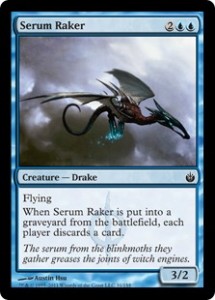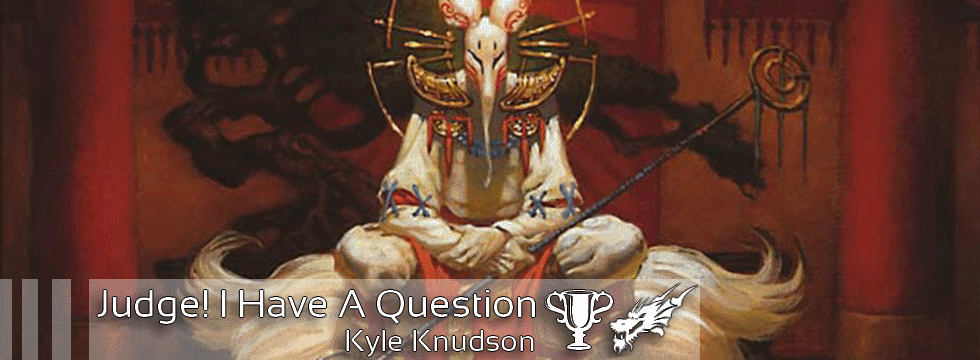Are you a Quiet Speculation member?
If not, now is a perfect time to join up! Our powerful tools, breaking-news analysis, and exclusive Discord channel will make sure you stay up to date and ahead of the curve.
This week I have another situation that came up at Grand Prix Denver. It was a call that I personally took, and it was pretty interesting. Let’s get right into it:

“Judge! I (Player A) had a Serum Raker in play. It had just gone to the graveyard from blocking a creature. I was recording Life totals before triggering his ability, and when I looked back up my opponent (Player B)had already played a Bladed Pinions. So this is a Missed Trigger, and now the trigger needs to go on the stack on top of his Bladed Pinions.”
Player A was very insistent on this penalty right out of the gate. I discovered right away that his opponent only had one other card in his hand. This player clearly wanted to make sure to get that other card out of his hand and not give his opponent a choice in the matter. But was this really the right call?
I started to investigate to see what exactly had happened. I asked Player B and he explained to me that he didn’t realize that his opponent’s creature had an ability on it, and just assumed after everything went to the graveyard he was free to move on to the next phase and start casting spells. This is a perfectly reasonable assumption to make. That had been the way things went the whole match so far, and if this creature hadn't had a triggered ability it wouldn’t have been a problem.
When I turned back to Player A to see what he thought, he told me that after creatures dealt damage in combat, he put his creatures in the Graveyard and reached for his score pad to adjust his life total from the attack before dealing with the triggered ability on his Raker. When he looked up his opponent had already cast a spell, which is when he called for a Judge.
This was the first thing that jumped out at me as strange. Usually, in my experience, a player makes sure all his triggers are handled and everything is taken care of before he changes his life total. However, after thinking about it, the way he went about it is technically correct. Very technically correct, in fact, as that is the way it would have happened on Magic Online.
Player A also wanted to clarify that in the current game state the Bladed Pinions was still on the stack. He was pushing really hard to make sure I knew we were definitely no longer in the attack phase. He really, really wanted that last card out of his opponent’s hand.
So now that we know that both players agree about what physically happened, we needed to figure out what to do so the game can go on.
I know that Player A had convinced himself that this is a Missed Trigger. At least he had convinced himself that it would be good for him if it was. If it was a Missed Trigger, we would apply the trigger right now, and his opponent would have to discard his last card and then the artifact would resolve. However, I’m not sure if this qualified.
It seemed pretty clear to me that one player (A) thought we were still in the combat step, readied for his trigger to go on the stack. The other player (B) thought they were already in the main phase, so much so that he had already cast a spell. Knowing this discrepancy, we needed to be backing things up to the point of confusion.
In order to do this, the IPG tells us that we needed to consult the Head Judge in order to do this. At a Grand Prix, this task is often delegated to any Judge level 3 or higher. So I found the closest level 3 and we had a brief discussion.
When I explained to him the situation, his first reaction was to remind me that we can’t back up a game state for a Missed Trigger penalty. This is true, but I didn' t suggest that this was a Missed Trigger. I had said that this was a Player Communication Violation.
There was an understood shortcut that was created between these players by the way they had played the match up to this point. That shortcut was that once damage was dealt, and creatures went to the graveyard, it was time to move on to the main phase. When you have a shortcut that exists, and suddenly it needs to change, sometimes a player doesn’t mention it right away. When this happens, it falls under the category of a Player Communication Violation.
After getting approval from the level 3 Judge, I returned to the match. Much to the dismay of Player A, I ruled to back-up the game state to the point of confusion, putting the Bladed Pinions back into Player B’s hand. I issued the Warning for Player Communication Violation to Player A for not being clear about his trigger and we put the trigger on the stack at the appropriate time.
The biggest reason for this, in my opinion, not being a Missed Trigger is that the player who had control of the trigger hadn’t missed it yet. In his mind the game had not yet reached the point where the trigger would go on the stack. The other player simply didn’t realize it was going to happen and tried to move on. Since one player was still in his end of combat step, and the other was in his Second Main Phase, I believe putting them both on the same page was the only way to go.
As Always, Keeping it Fun
Kyle Knudson
Level 2 Judge
Allon3word at gmail.com
BONUS RULES STUFF
Triggered Abilities
Triggered Abilities are special abilities that rather than get activated, they “trigger” on a specific event. When that event happens, the ability goes on the stack before the next time a player would receive priority. This happens after State Based Actions are checked.
If multiple Triggers happen during the same period of time between players receiving priority, they will all be put on to the stack in what is called Active Player, Non-Active Player order (APNAP). The Active player (the player whose turn it is) will choose the order that his or her triggered abilities will go on the stack first. Then, each other player in turn order will put their abilities on the stack in the order they choose.
The abilities will then resolve as normal, in the opposite order they were put on the stack. Under normal circumstances the Non-Active Player’s triggered abilities will always resolve first.






I don't believe I can support all the aspects of your resolution as you've presented them.
TE – Player Communication Violation can only be applied to cases where MTR 4.1 has been violated. In short, this occurs when a player miscommunicates regarding Free or Derived information. As per TE – PCV "This infraction only applies to violations of the Player Communication policy, not general communication confusion." It does not apply to MTR 4.2 Shortcuts.
That being said, I believe you are quite correct that this is not a missed trigger. It is the owner's responsibility to put it on the stack, which he presumably will get to once he is done adjusting the life totals. Player B's assumption that nothing will ever intervene between combat damage and his second main phase is not a shortcut; he has moved ahead inappropriately.
It is tempting to find a penalty here (GRV to player B for casting a creature as if it had haste when it does not; that is the other category of error which allows backing up conveniently enough), but I feel like that's another case of retro-engineering a penalty to fit the resolution. I think the most appropriate thing to do is use the language of MTR 4.1 "If the players are confused by the use of a tournament shortcut, they
should be backed up to the beginning of the shortcut and no penalty should be issued (though they should be reminded to play more clearly)."
In short: let's be clear about what constitutes TE – Player Communication Violation. It does not cover general confusion.
Finally, how can we resolve this with a penalty to the player who is playing correctly?
Interestingly enough, the latest update to the MTR puts Phase of the Game in the category of Free Information.
I also have a problem with penalizing players who play correctly. I get really frustrated by situation like this, as this type of thing has happened to me as well. You can't stop your opponent from playing cards illegally, and you cannot play a match walking them through the beginning and end of every phase and step. I look down to adjust a life total, and my opponent can't read cards, and I get a warning? That's not how it should work, especially since these penalties actually can accumulate on players over the course of a weekend even if they do nothing wrong.
Agreed. A player should never get a penalty for something his opponent screwed up in a way that he can't do anything about. This is something I've long had a problem with. This isn't "opponent didn't bin a guy" where it's obviously visible and the innocent player has the ability to correct without getting a judge involved.
The DCI guidelines aren't as bad in this regard as they used to be, but it's still a problem and shouldn't be.
However, in this situation, the player pushing heavily to get the other card discarded is questionable and possibly even Unsporting. He's clearly trying to get a particular ruling for strategic interest rather than simply get the game back to a proper state.
The problem here is that the player A may be taking advantage of the situation, waiting for the other player to just go on and miss the trigger, instead of just telling him: "My creature goes to the graveyard, you have to discard a card". He thought he knew the ruling, so it looks like he created a situation that would favor him.
This happens more often than you can imagine, particularly when the game is not casual. In my opinion Kyle ruling is correct: rulings should discourage players to try to get leverage from not being clear and kind with their opponents. This game is supposed to be fun.
If Player A is lying to a judge about the situation or cheating, then he's going to get DQ'ed. That doesn't seem to be going on here, but it's definitely something judges look into. If he's too adamant, an Unsporting Conduct penalty may be in order.
My point is that we can't apply the wrong penalty to the wrong person because it feels right or brings about the correct game state. Even if he is angling…